Higashibayashi, S.; Pandit, P.; Haruki, R.; Adachi, S.-I.; Kumai, R. Angew. Chem. Int. Ed. 2016, 55, 10830-10834
Contributed by Steven Bacharach
Reposted from Computational Organic Chemistry with permission
 '
'
This work is licensed under a Creative Commons Attribution-NoDerivs 3.0 Unported License.
Contributed by Steven Bacharach
Reposted from Computational Organic Chemistry with permission
Higashibayashi and co-workers prepared the hydrazine-substituted Buckyball fragment 1a and also its mono- and deoxidized analogues.1 To interpret their results, they also computed the parent structure 1bat ωB97Xd/6-311+G(d,p).
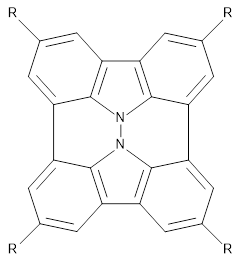 1a R = tBut 1b R = H |
The optimized structure of 1b is a bowl, but a twisted geometry, where the lone pair on each
nitrogen is on the opposite face of the molecule, lies only 1.6 kcal mol-1 higher in energy. The barrier for moving from the bowl to the twist form is 2.0 kcal mol-1. The completely planar structure, which is also a transition state for inversion of the bowl, lies 5.1 kcal mol-1 above the lowest energy bowl structure. The geometries and energies of the conformations are shown in Figure 1.
nitrogen is on the opposite face of the molecule, lies only 1.6 kcal mol-1 higher in energy. The barrier for moving from the bowl to the twist form is 2.0 kcal mol-1. The completely planar structure, which is also a transition state for inversion of the bowl, lies 5.1 kcal mol-1 above the lowest energy bowl structure. The geometries and energies of the conformations are shown in Figure 1.
1b bowl (0.0)
|
1b twist (1.6)
|
1b TS (2.0)
|
1b planar TS (5.11)
|
Figure 1. ωB97Xd/6-311+G(d,p) optimized
geometry and relative energy (kcal mol-1) of the conformations of 1b.
geometry and relative energy (kcal mol-1) of the conformations of 1b.
The mono oxidized 1b.+ structure is also a bowl, but there is no twist form and inversion takes place through a planar structure that is only 0.5 kcal mol-1 above the bowl ground state. The structures and energies of these conformations of 1b.+ are shown in Figure 2.
1b.+ bowl (0.0)
|
1b.+ planar TS (0.5)
|
Figure 2. ωB97Xd/6-311+G(d,p) optimized geometry and relative energy (kcal mol-1) of the conformations of 1b.+.
Lastly, the di-oxidized 1b2+ is planar, and its structure is shown in Figure 3.
1b2+ planar
|
Figure 2. ωB97Xd/6-311+G(d,p) optimized geometry of 1b2+.
These computations corroborate all of the experimental data observed with 1a. What is particularly of note is the fact that the potential energy surface is so dependent on charge state: a three-well potential for the neutral, and two-well potential for the monocation, and a single-well potential for the dication.
References
(1) Higashibayashi, S.; Pandit, P.; Haruki, R.; Adachi, S.-I.; Kumai, R. “Redox-Dependent
Transformation of a Hydrazinobuckybowl between Curved and Planar Geometries,” Angew. Chem. Int. Ed.2016, 55, 10830-10834, DOI: 10.1002/anie.201605340.
Transformation of a Hydrazinobuckybowl between Curved and Planar Geometries,” Angew. Chem. Int. Ed.2016, 55, 10830-10834, DOI: 10.1002/anie.201605340.
InChIs
1a: InChI=1S/C40H44N2/c1-37(2,3)21-13-25-26-14-22(38(4,5)6)19-31-32-20-24(40(10,11)12)16-28-27-15-23(39(7,8)9)18-30-29(17-21)33(25)41(34(26)31)42(35(27)30)36(28)32/h13-20H,1-12H3
InChIKey=DKJNIDLSMMQIBX-UHFFFAOYSA-N
InChIKey=DKJNIDLSMMQIBX-UHFFFAOYSA-N
1b:InChI=1S/C24H12N2/c1-5-13-14-6-2-11-19-20-12-4-8-16-15-7-3-10-18-17(9-1)21(13)25(22(14)19)26(23(15)18)24(16)20/h1-12H
InChIKey=JQNPHLTXAOKXNQ-UHFFFAOYSA-N
InChIKey=JQNPHLTXAOKXNQ-UHFFFAOYSA-N
 '
'This work is licensed under a Creative Commons Attribution-NoDerivs 3.0 Unported License.
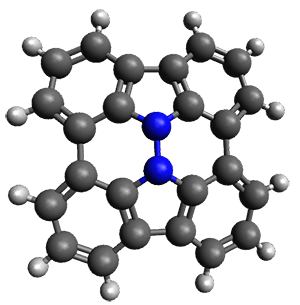
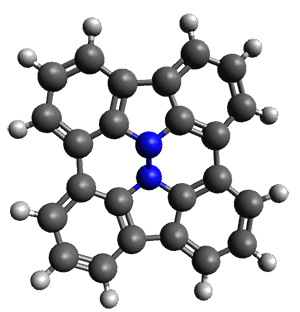
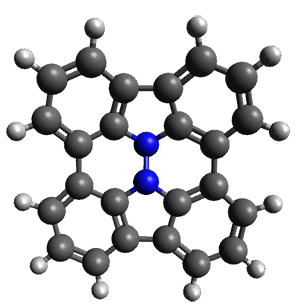
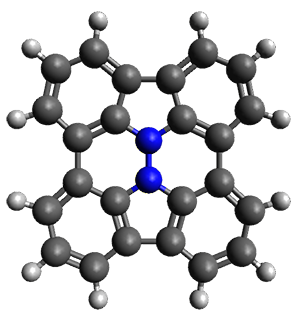
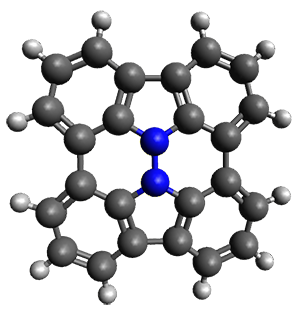
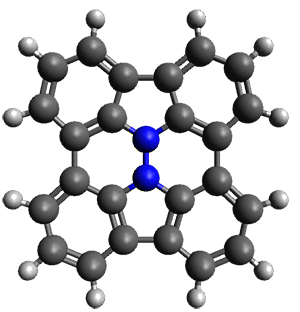
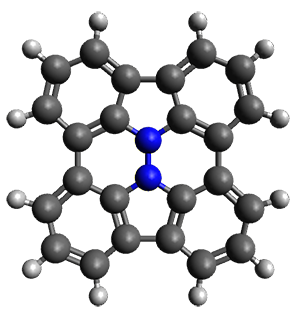
No comments:
Post a Comment